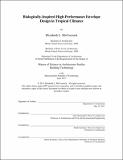Biologically-inspired high-performance envelope design in tropical climates
Author(s)
McCormick, Elizabeth L. (Elizabeth Lister)
DownloadFull printable version (30.57Mb)
Other Contributors
Massachusetts Institute of Technology. Department of Architecture.
Advisor
John Ochsendorf and Sheila Kennedy.
Terms of use
Metadata
Show full item recordAbstract
Removed from bioclimatic design and vernacular styles, modern buildings have become merely icons, symbolic of humankind's victory over nature - evident in the rapid escalation of global greenhouse gas emissions and fossil fuel consumption. As tropical regions face unprecedented growth, this thesis looks to the physiological adaptations of tropical plants to identify fac̦ade design strategies that reduce or eliminate the need for air conditioning in hot-humid regions. Using the dynamic stressors of tropical climates as a source of inspiration, this work hypothesizes that the abundant latent energy found in tropical climates can be used to power discernable thermal change in unconditioned spaces. Using environmental cues to trigger non-linear events, plants can change observable characteristics in response to even small changes in external stimuli. This research questions how extreme differentials at the façade can promote change in interior environments. Using infrared photography to understand the thermal response of tropical plants under environmental stress plus an extensive review of plant physiology, this thesis explores space, variability and storage, as strategies for building enclosure systems. Given the innate ability of porous materials to change characteristics in different environments, materials are manipulated to control directional vapor drive in ways that benefit interior thermal comfort. To explore the hygrothermal behavior of potential enclosure materials and assemblies, the author designed and constructed a custom tabletop hotbox, which is easily and affordably replicated. Through extensive testing and biological translation, the result is a repeatable method of exploring natural phenomena and choreographing moisture drive in building materials, as inspired by plant biology.
Description
Thesis: S.M. in Architecture Studies, Massachusetts Institute of Technology, Department of Architecture, 2017. This electronic version was submitted by the student author. The certified thesis is available in the Institute Archives and Special Collections. Cataloged from student-submitted PDF version of thesis. Includes bibliographical references (pages 105-108).
Date issued
2017Department
Massachusetts Institute of Technology. Department of ArchitecturePublisher
Massachusetts Institute of Technology
Keywords
Architecture.